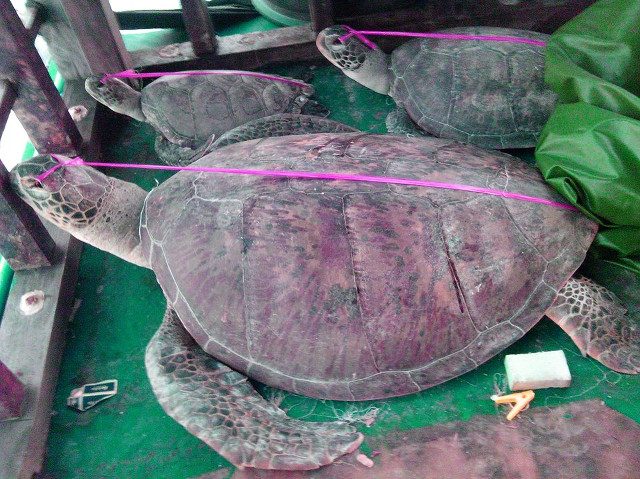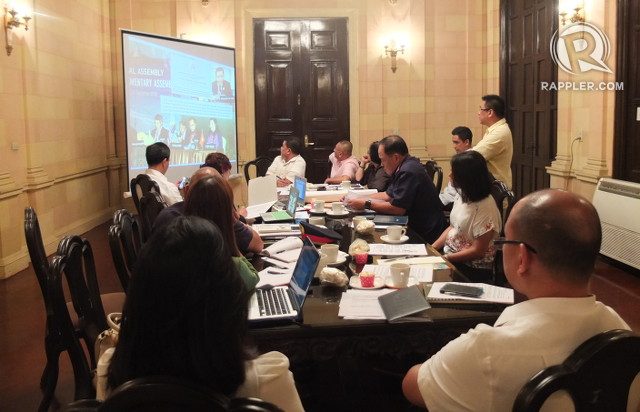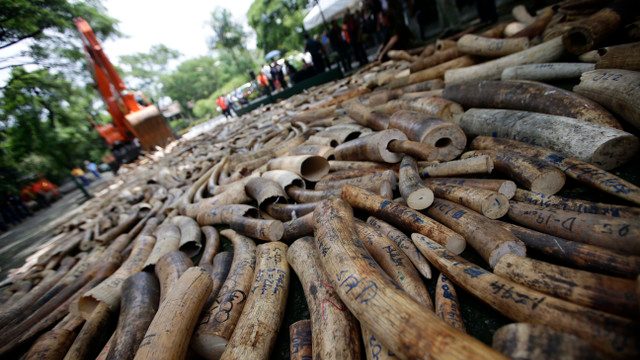SUMMARY
This is AI generated summarization, which may have errors. For context, always refer to the full article.

MANILA, Philippines – At the 11th hour of the Aquino presidency, anti-trafficking operatives and environment officials are preparing an executive order to form an interagency body against the illegal trafficking of wildlife in the country.
The executive order (EO) draft seen by Rappler names the body the National Anti-Wildlife Crime Council (NAWCC). Its mission will be to investigate and prosecute wildlife crime defined as illegal logging, wildlife trafficking, and illegal, unreported, and unregulated fishing.
The NAWCC would be the Philippines’ answer to international commitments to combat illegal wildlife trade in Southeast Asia, Presidential Adviser for Environmental Protection Neric Acosta said during an August 17 meeting in Malacañang on the EO.
One of these pledges is the East Asia Summit Declaration on Combatting Wildlife Trafficking in November 2014 in Myanmar. President Benigno Aquino III, along with other Southeast Asian leaders and US President Barack Obama, signed the declaration.
Another is the United Nations resolution committing countries to ramp up efforts against wildlife crime, adopted on July 30.

Under the draft EO, the NAWCC will be under the Office of the President, making it the national task force at the highest level of government among member-states of the Association of Southeast Asian Nations (ASEAN).
Similar bodies in other ASEAN countries are only at the ministerial level, said Brian Gonzales of international anti-trafficking group Freeland.
“This could be a ground-breaking and cutting-edge group. The Philippines can be a model for the region,” said Acosta.
The chairperson of the NAWCC will be appointed by the president. It will have as members personnel from the Biodiversity Management Bureau (BMB), Philippine National Police, Philippine Coast Guard, Bureau of Fisheries and Aquatic Resources, Bureau of Customs, and the Department of Justice.
ASEAN network
The NAWCC will join the ASEAN Wildlife Enforcement Network, a coalition of anti-wildlife crime task forces of all ASEAN nations. Right now, the Philippines is represented only by the Philippine Operations Group on Ivory and Illegal Wildlife Trade (POGI).
BMB Wildlife Resources Division chief Josie De Leon admitted that POGI is “limited” since it involves only a few agencies and limited manpower and resources.
“We need support from everyone. We do everything from investigation, to raids, to filing of cases, which is too much for us. Not everyone is capacitated,” she said at Monday’s Palace meeting.
Her team of 3 at the BMB handles all wildlife crime incidents in the country. They depend on PNP and sometimes military personnel to conduct the actual arrests and raids.
NAWCC could be the answer to her prayers – “a body that has an operational structure, an office with necessary equipment manned by full-time and dedicated enforcement officers from key agencies led by a committed, firm and credible chairperson with adequate administration, tech and support staff.”
The ASEAN is a recognized hotspot for illegal wildlife trade due to its high biodiversity, well-established smuggling routes, and transport links.
Since 2008, ASEAN national task forces seized wildlife worth $94 million in the blackmarket, according to Freeland. Illegal wildlife trade in the region is conservatively estimated to be worth $2.5 billion a year.
The global illegal wildlife trade is an estimated multi-billion dollar industry and is the world’s 3rd largest black market, surpassed only by illegal trade in drugs and arms.
Powerful syndicates
Pinning wildlife trafficking syndicates is no walk in the park. It takes months of gathering information, paying off informants, and stake-outs before an actual raid. (READ: The unsung lives of illegal wildlife trade cops)
Even when an arrest is made, suspects are able to walk free due to “technicalities” unforeseen by operatives not trained in the proper filing of cases.

Other times, powerful people intervene. A DOJ official told Rappler during the meeting that governors, congressmen, and wealthy businessman are able to “make calls” to stop raids or ask for cases to be dropped.
They are also able to pay skilled lawyers to ostracize government operatives with lawsuits until they are burned out.
Wildlife crime syndicates are getting more sophisticated with their strategies. They now take their trade online where they are harder to track. They are part of elaborate global networks too, backed by the wealth gained from the lucrative illegal trade.
Combine this with the fact that wildlife crime is intricately linked to the trafficking of drugs, arms, and people, said Gonzales.
“Illegal wildlife trafficking is a national security issue,” he summed up.
Too late in the game?
There were those in the meeting who feared the NAWCC would easily be repealed by the next president, given that it is created only by an executive order.
But Acosta said the weight of international agreements would be behind it. If the NAWCC would prove effective in the last months of the Aquino administration, there was a good chance it would be kept by the next president.
Other agencies created by past EOs survive to this day, such as the Philippine Center on Transnational Crime (PCTC) borne out of a 1999 EO. The PCTC was also the country’s response to an ASEAN commitment to fight illicit trafficking of drugs, terrorism, piracy, and money laundering.
It was also suggested that the creation of the NAWCC be included in amendments to the Wildlife Resources Conservation and Protection Act of 2001.
Many law enforcers want the law amended because its penalties for wildlife crime are too low.
Illegal wildlife traders are fined as low as P5,000 ($108), with the maximum fine not higher than P300,000 ($6,500). This is loose change for powerful syndicates. Once the fine is paid, suspects are able to return to the profitable trade.
Acosta said the EO will be presented to Aquino by the end of August. – Rappler.com
$1 = P46
Add a comment
How does this make you feel?
There are no comments yet. Add your comment to start the conversation.